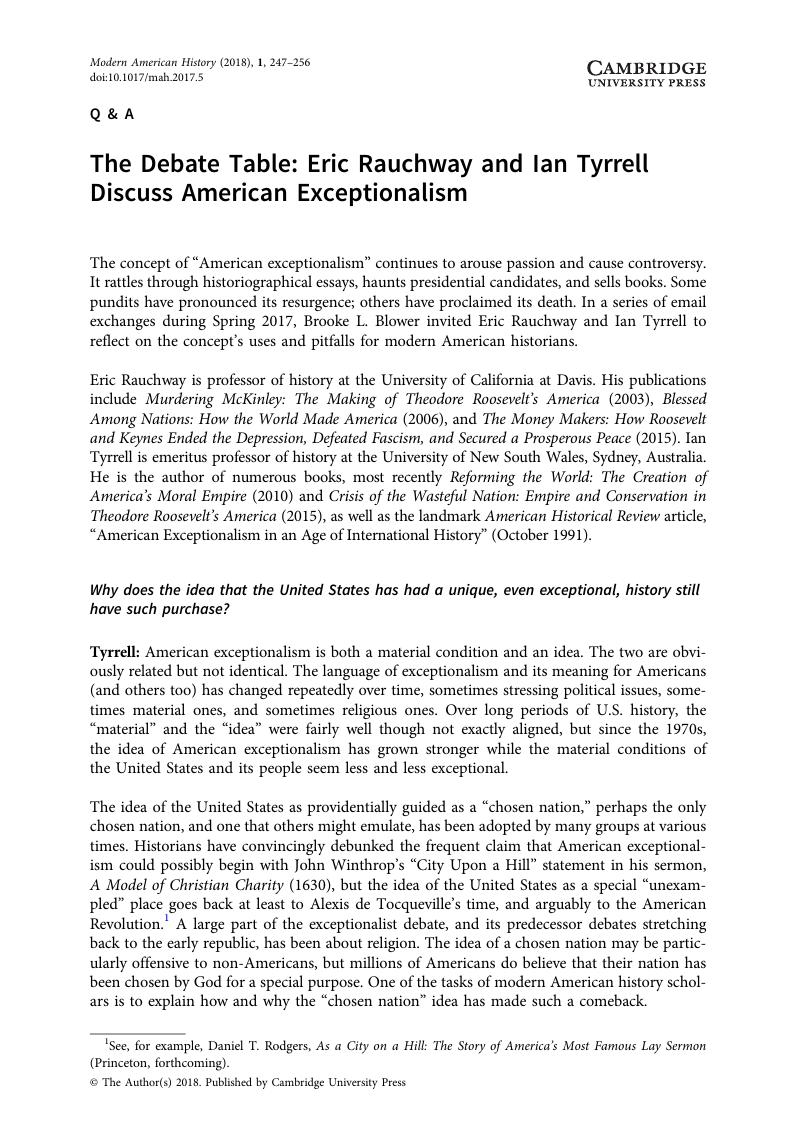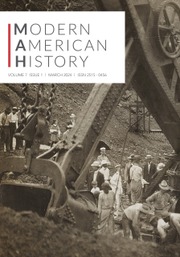No CrossRef data available.
Article contents
The Debate Table: Eric Rauchway and Ian Tyrrell Discuss American Exceptionalism
Published online by Cambridge University Press: 27 February 2018
Abstract

Keywords
- Type
- Q&A
- Information
- Copyright
- Copyright © The Author(s) 2018. Published by Cambridge University Press
References
1 See, for example, Daniel T. Rodgers, As a City on a Hill: The Story of America's Most Famous Lay Sermon (Princeton, forthcoming).
2 “2012 Republican Party Platform,” Aug. 27, 2012, American Presidency Project, http://www.presidency.ucsb.edu/ws/?pid=101961#american (accessed May 20, 2017).
3 Rodgers, Daniel T., “Exceptionalism,” in Imagined Histories: American Historians Interpret the Past, eds. Mohlo, Anthony and Wood, Gordon S. (Princeton, NJ, 1998), 21–40Google Scholar.
4 Hartz, Louis, The Liberal Tradition in America: An Interpretation of American Political Thought Since the Revolution, 2nd ed. (San Diego, 2001)Google Scholar; Hofstadter, Richard, The American Political Tradition and the Men Who Made It, 25th anniv. ed. (New York, 1996)Google Scholar; Foner, Eric, “Why Is There No Socialism in the United States?” History Workshop no. 17 (Spring 1984): 57–80Google Scholar.
5 Turner, Frederick Jackson, The Frontier in American History (New York, 1920)Google Scholar; Hoover, Herbert, American Individualism (New York, 1922)Google Scholar.
6 Cowie, Jefferson, The Great Exception: The New Deal and the Limits of American Politics (Princeton, NJ, 2016)Google Scholar; Borgwardt, Elizabeth, A New Deal for the World: America's Vision for Human Rights (Cambridge, MA, 2005)CrossRefGoogle Scholar.
7 Darmstadter, Joel, with Teitelbaum, Perry D. and Polach, Jaroslav G., Energy in the World Economy: A Statistical Review of Trends in Output, Trade, and Consumption since 1925 (Baltimore, MD, 1971), Table XI, 652–91Google Scholar; Smil, Vaclav, Energy in World History (Boulder, CO, 1994), 235–7Google Scholar.
8 Sam Perlo-Freeman, Aude Fleurant, Pieter D. Wezeman, and Siemon T. Wezeman, “Trends in World Military Expenditure,” SIPRI Fact Sheet, Stockholm International Peace Research Institute, Apr. 2015, https://www.sipri.org/sites/default/files/files/FS/SIPRIFS1504.pdf (accessed Dec. 27, 2017); Bacevich, Andrew J., America's War for the Greater Middle East: A Military History (New York, 2016)Google Scholar; Andrew Bacevich, “The Age of Great Expectations and the Great Void: History After ‘the End of History,’” TomDispatch, Jan. 8, 2017, http://www.tomdispatch.com/post/176228/tomgram%3A_andrew_bacevich%2C_how_we_got_here/ (accessed Feb. 6, 2018).
9 Sombart, Werner, Why Is There No Socialism in the United States? trans. by Hocking, Patricia M. and Husbands, C. T. (London, 1976), 106CrossRefGoogle Scholar.
10 “From Keynes to Roosevelt: Our Recovery Plan Assayed,” New York Times, Dec. 31, 1933, XX2.
11 For a good example, see Körner, Axel, Miller, Nicola, and Smith, Adam I.P., eds., America Imagined: Explaining the United States in Nineteenth-Century Europe and Latin America (Basingstoke, UK, 2012)CrossRefGoogle Scholar.
12 Sombart, Why Is There No Socialism in the United States?
13 See, for example, Zumoff, Jacob A., The Communist International and US Communism, 1919–1929 (Leiden, 2014), chs. 12–13CrossRefGoogle Scholar.
14 See, for example, Lipset, Seymour Martin, The First New Nation: The United States in Historical and Comparative Perspective (New York, 1963)Google Scholar; Blanc, Paul Le and Davenport, Tim, eds., Dissident Marxism in the United States, Vol. I: The ‘American Exceptionalism’ of Jay Lovestone and his Comrades, 1929–1940 (Leiden, 2015)Google Scholar.
15 Brown, Kate, Plutopia: Nuclear Families, Atomic Cities, and the Great Soviet and American Plutonium Disasters (Oxford, 2013)Google Scholar; Peacock, Margaret, Innocent Weapons: The Soviet and American Politics of Childhood in the Cold War (Chapel Hill, NC, 2014)CrossRefGoogle Scholar.
16 Twain, Mark, “The Czar's Soliloquy,” in Mark Twain on the Damned Human Race (New York, 1962), 194–201Google Scholar; Sunderland, Willard, Taming the Wild Field: Colonization and Empire on the Russian Steppe (Ithaca, NY, 2004)Google Scholar.
17 de Bromhead, Alan, Eichengreen, Barry, and O'Rourke, Kevin H., “Political Extremism in the 1920s and 1930s: Do German Lessons Generalize?” Journal of Economic History 73, no. 2 (June 2013): 371–406CrossRefGoogle Scholar.
18 Rodgers, Daniel T., Atlantic Crossings: Social Politics in a Progressive Age (Cambridge, MA, 1998)Google Scholar.
19 Kruse, Kevin M., One Nation Under God: How Corporate America Invented Christian America (New York, 2015)Google Scholar.
20 Tyrrell, Ian, “Historical Writing in the United States,” in Oxford History of Historical Writing, Vol. V: Historical Writing since 1945, eds. Schneider, Axel and Woolf, Daniel (Oxford, 2011), 473–95Google Scholar.
21 Tyrrell, Ian, “Walking and Chewing Gum at the Same Time: Nation and Transnational History,” Rivista di Studi Americani 25 (2014): 162–9Google Scholar.
22 Peter Navarro quoted in Shawn Donnan, “Trump's Top Trade Adviser Accuses Germany of Currency Exploitation,” Financial Times, Jan. 31, 2017, https://www.ft.com/content/57f104d2-e742-11e6-893c-082c54a7f539 (accessed Feb. 6, 2018).
23 Rauchway, Eric, Blessed Among Nations: How the World Made America (New York, 2006)Google Scholar.
24 “Fourth Inaugural Address of Franklin D. Roosevelt,” Jan. 20, 1945, Avalon Project: Documents in Law, History and Diplomacy, http://avalon.law.yale.edu/20th_century/froos4.asp (accessed Apr. 17, 2017).
25 Ronald Reagan, “Farewell Address to the Nation,” Jan. 11, 1989, American Presidency Project, http://www.presidency.ucsb.edu/ws/?pid=29650 (accessed Apr. 14, 2017).


